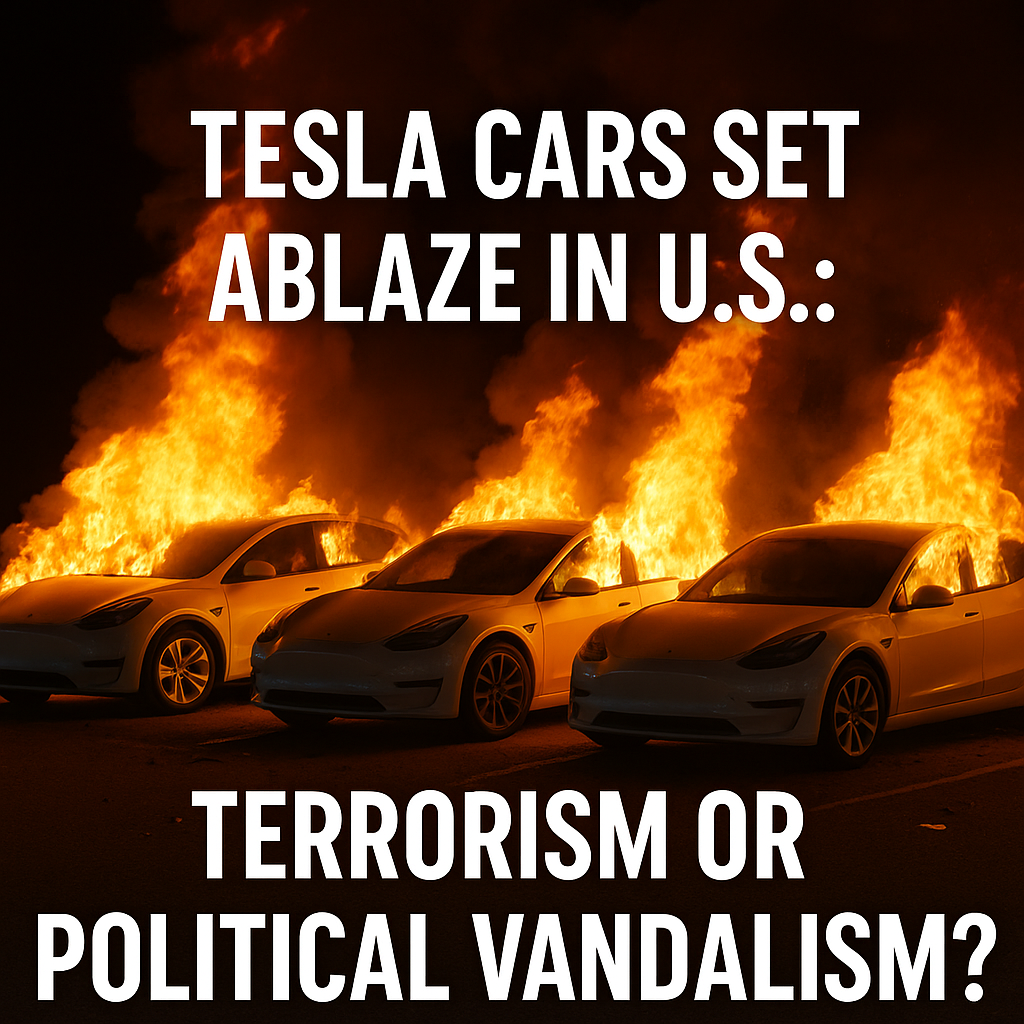Washington, D.C. – In a shocking incident that has stirred both national security concerns and political controversy, several Tesla vehicles were allegedly set on fire in different parts of the United States.
While official investigations are still underway, early reports suggest possible foul play.
Speculation is growing about whether this was an act of terrorism, politically-motivated vandalism, or an expression of public dissent.
The incidents have sent shockwaves through the American public, especially considering the high-profile nature of Tesla’s CEO, Elon Musk.
Known for his disruptive innovations and polarizing statements, Musk has always been a figure of intrigue and controversy.
What makes this series of attacks even more significant is Musk’s known closeness to former President Donald Trump—
a factor that has led many to believe this act could have political undertones.
What Happened?

According to local law enforcement sources, multiple Tesla cars were found set ablaze overnight in urban areas such as Los Angeles,
New York City, and Houston. Eye-witnesses reported seeing masked individuals near the parked vehicles just moments before the flames erupted.
In all reported cases, fire departments responded quickly and were able to extinguish the fires before they could spread.
Fortunately, no injuries or fatalities were reported.
Authorities have not officially confirmed the motive behind the arson, but the Department of Homeland Security has classified it as a “potential domestic sabotage,” pending further investigation. Surveillance footage from nearby establishments is currently under review.
Was It a Terrorist Attack?
The use of the word “terrorism” in this context is controversial.
While some media outlets have already jumped to conclusions, national security experts caution against making hasty judgments.
“This could be anything from a targeted attack by eco-activists, politically motivated arsonists, or even a coordinated protest gone wrong,” said Mark Donnelly, a retired FBI agent now working as a private security consultant.
As of now, no organization has claimed responsibility for the attacks.
However, the pattern and timing have raised questions, especially in light of Tesla’s recent troubles and Elon Musk’s political leanings.
The Elon Musk–Trump Connection
Elon Musk’s relationship with Donald Trump has been a topic of intense discussion in American political circles.
Though Musk has previously expressed disagreements with both Democratic and Republican policies,
his more recent engagements suggest a tilt towards Trump-era ideologies, especially when it comes to deregulation and freedom of speech.
During Trump’s presidency, Musk was a member of several advisory councils. In recent months, he has publicly voiced support for Trump’s free speech campaign and has been openly critical of the Biden administration’s climate and economic policies.
Given the current political climate and rising polarization in the U.S., some analysts believe that targeting Tesla could be an indirect way of attacking Musk’s ideology and affiliations.
Tesla’s Recent Market Troubles
Adding to the complexity is the fact that Tesla has recently been struggling in the market.
Sales have declined significantly over the last two quarters, with a noticeable dip in customer interest and investor confidence.
Factors include increased competition from Chinese EV makers, supply chain issues, and growing concerns over Tesla’s controversial self-driving software.
A consensus of analyst forecasts expect Tesla to report revenue of approximately $21.81 billion and earnings per share (EPS) of $0.43 for Q1 2025. If these projections hold true, it would mark one of Tesla’s weakest quarters since 2022, further fueling public scrutiny and political debate around the company’s direction.
Moreover, opposition parties and certain state representatives have not held back in expressing criticism of Tesla. Some have questioned the company’s labor practices, while others have accused it of receiving unfair tax benefits.
Just last week, a prominent Democratic senator referred to Tesla as “a monopoly masquerading as innovation”—
a statement that sparked both outrage and applause across the political spectrum.
Public Reaction and Security Concerns
The incident has prompted renewed discussions about the security of electric vehicles
and the need for stricter surveillance around high-value assets.
Tesla owners across the country have expressed concern, with some even posting videos of themselves checking their vehicles for tampering.
the focus shifts to the social media experiencing the mixed reaction.
While many condemned the violence and called for swift justice,
others used the incident to highlight what they see as Tesla’s growing list of issues,
including labor disputes, safety concerns, and pricing controversies.
What’s Next?
The FBI and DHS are jointly investigating the incidents and have promised a detailed update soon. Meanwhile, Tesla has yet to release an official statement, and Elon Musk has remained uncharacteristically silent on the matter, leading to further speculation.
Whether these attacks were politically motivated, a result of corporate rivalry, or simply criminal mischief,
the events have undoubtedly raised serious questions about the safety and symbolism of Tesla in America’s cultural and political landscape.

